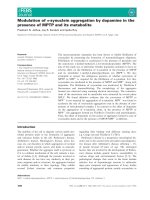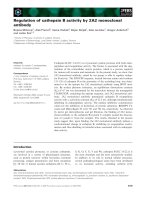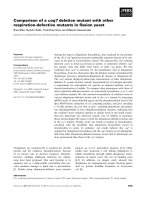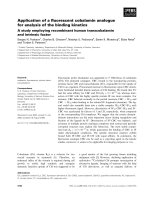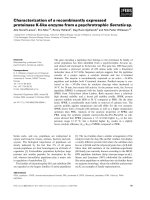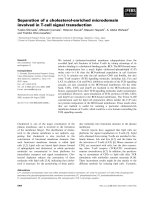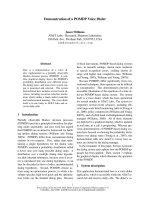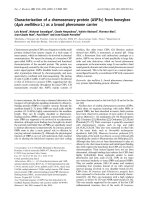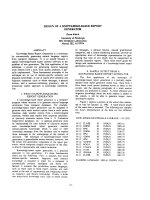Báo cáo khoa học: " Penetration of the English language in science: the case of a German national interdisciplinary critical care conference" docx
Bạn đang xem bản rút gọn của tài liệu. Xem và tải ngay bản đầy đủ của tài liệu tại đây (34.3 KB, 2 trang )
655
Available online />Globalization in business, politics and other aspects of our
everyday life is viewed by many as an inevitable reality. The
English language has undoubtedly benefited significantly from
the new era, in gradually penetrating into other cultures in
many fields such as music, arts, education, and more recently
science. Previous reports indicate that such penetration is
also evident in the field of biomedical sciences [1,2], primarily
supported by the paper and online publication in the English
language of the majority of about 6,000 journals indexed in
PubMed. The adoption of a universal language in science,
namely English, could facilitate communication between
individuals from different countries and enhance the timely
interchange of ideas among researchers and scientists with
potential benefits to scientific advancement and development
[3]. Language barriers could also potentially be eliminated and
diffusion of knowledge could be promoted through the World
Wide Web in real time.
However, the dominance of the English language in the
scientific field, including teaching, academic education,
research publications, meetings, conferences and scientific
societies, could also lead to poorer outcomes in the field of
research and development because of the possible exclusion
of those not able or not willing to adapt. It might also contribute
to the gradual elimination of other languages and potentially
other cultures, with unknown consequences for the
advancement of science. Biodiversity in nature is viewed as an
important factor in the maintenance of a balanced and healthy
environment. Perhaps a similar diversity in languages and
cultures promotes instead of obstructs scientific advancement
[4]. German researchers have contributed significantly to
science in many different fields, including the biomedical
sciences. In the past century, the German language was
recognized among Europeans as the language most frequently
used in science [5]. To evaluate the possible penetration of
English into the German language, we studied the use of
English at a German national medical conference.
We assessed the use of the English language in the
published abstracts of a major German national conference,
namely the German Interdisciplinary Conference of Intensive
Care Medicine and Emergency Medicine (Deutscher
Interdisziplinärer Kongress für Intensivmedizin und
Notfallmedizin, Deutschen Interdisziplinären Vereinigung für
Intensivmedizin und Notfallmedizin (DIVI)). The abstract
books of all seven DIVI conferences, organized between
1991 and 2004, were reviewed to count the number of
abstracts presented at each conference as well as the
subsets of abstracts presented in English. All abstracts
presented in English were reviewed further to identify the
country of origin of the authors. These abstracts were
categorized into three groups. The first group included those
abstracts presented solely by investigators based in German
universities, hospitals or institutions. Abstracts that were the
result of collaboration between investigators from Germany
and other countries were included in a second category, and
abstracts presented by investigators from countries other
than Germany were classified into a third group.
Table 1 shows the total number of abstracts presented in the
seven DIVI conferences, as well as the proportion of
abstracts presented in English. As is shown, no abstract was
presented in English during the first, second and third DIVI
conferences. However, there was a gradual increase in the
proportion of abstracts presented in English during the
subsequent DIVI conferences (from 1.6% to 25.1%). Of the
total of 98 abstracts presented in English during the last four
DIVI conferences, 86 were written by solely German
investigators, on the basis of the information provided. Three
abstracts were the result of collaboration between
investigators from Germany and other countries (Austria,
Israel and the USA). The remaining nine abstracts were
presented by investigators from countries other than
Germany (Poland (4), UK (2), Austria (1), Slovakia (1) and the
USA (1)).
Letter
Penetration of the English language in science: the case of a
German national interdisciplinary critical care conference
Matthew E Falagas
1
, Eufemia Fabritsi
2
, Fotini C Chelvatzoglou
2
and Konstantinos Rellos
3
1
Adjunct Assistant Professor of Medicine, Tufts University School of Medicine, Boston, Massachusetts, and President and Director, Alfa Institute of
Biomedical Sciences (AIBS), Athens, Greece
2
Scientific Associate, Alfa Institute of Biomedical Sciences (AIBS), Athens, Greece
3
Associate Director, Intensive Care Unit, ‘Henry Dunant’ Hospital, Athens, Greece
Corresponding author: Matthew E Falagas,
Published online: 16 September 2005 Critical Care 2005, 9:655-656 (DOI 10.1186/cc3817)
This article is online at />© 2005 BioMed Central Ltd
656
Critical Care December 2005 Vol 9 No 6 Falagas et al.
There is a growing debate around the world about the rapid
penetration of the English language into various expressions of
human activity, including science [6-9]. It is estimated that half
of the world population will use English by the year 2015. The
results of our analysis suggest that the penetration of English
into a German national interdisciplinary medical conference
that has been attended mostly by German-speaking
investigators was astounding. The fact that about one-quarter
of the abstracts were presented in English at the last DIVI
conference (2004) deserves the attention of German scientists
as well as the broad scientific community worldwide. It should
also be noted that most (88%) of the abstracts in English were
presented by investigators based solely in German universities,
hospitals or other German institutions.
There are several possible explanations for the observed
penetration of the English language in the German national
medical conference studied that might also operate in other
scientific activities in most non-English-speaking countries.
There is a language effect that pressures investigators to
publish their work in journals indexed by Index Medicus and
the Institute for Scientific Information because of the visibility
of papers appearing in the PubMed database and the
influence of their impact factor, respectively. Practical
reasons might therefore guide investigators to prepare their
work in English for submission for publication. In addition, the
use of English can be considered an important qualification
distinguishing researchers who are fluent in English from
others lagging behind in many non-English-speaking
countries. German investigators might also present abstracts
in English at their national conference after those same
abstracts have already been presented at an English-
speaking international conference. Finally, it is possible that
the organizing committee of the studied conference might
have invited the use of English in an attempt to increase the
number of non-German-speaking delegates.
In conclusion, we found that about one-quarter of the
abstracts presented at a German medical conference were
written in English, indicating a significant penetration of the
English language into a German national multidisciplinary
conference. We believe that the results of our study merit
attention from the scientific community around the world for
two main reasons: first, because a considerable penetration
of English was evident at a particular conference that is
attended mostly by German-speaking scientists and
clinicians, who elected to present their abstracts to a
German-speaking audience in English, and second, because
the German language, with its tradition and rich history in
science as well as its popularity, was thought to be one of the
most difficult languages in Europe to penetrate. Our findings
suggest that researchers around the world should engage in
an open and unbiased discussion about the future of
languages in science.
Competing interests
The author(s) declare that they have no competing interests.
Authors’ contributions
MEF and EF conceived the study. FCC and KR collected the
data. MEF drafted the manuscript. All authors contributed in
the writing and preparation of the manuscript. All authors
read and approved the final manuscript.
References
1. Dinkel A, Berth H, Borkenhagen A, Brahler E: On raising the
international dissemination of German research: does chang-
ing publication language to English attract foreign authors to
publish in a German basic psychology research journal? Exp
Psychol 2004, 51:319-328.
2. Yamazaki S, Zhang H: Internationalization of the English-lan-
guage journals in Japan in life sciences. Nippon Seirigaku
Zasshi 1997, 59:98-104.
3. Montgomery S: Of towers, walls, and fields: perspectives on
language in science. Science 2004, 303:1333-1335.
4. Hayes-Rivas JJ: One world scientific language? Science 2004,
304:1243.
5. Beller F.K: The future of the German language in science.
Gynakol Geburtshilfliche Rundsch 2000, 40:50-54.
6. Nelde PH: Suggesting a new European language policy. Coll
Antropol 2004, 28 Suppl 1:13-26.
7. Walvoort HC: Medical science in the Dutch language. Ned Tijd-
schr Geneeskd 1997, 141:5-7.
8. Hasse W, Fischer RJ: The medical profession against Angli-
cization in medicine. Results of a survey. Dtsch Med Wochen-
schr 2003, 128:1338-1341.
9. Olivier C, Casseyre P, Vayssairat M: How to assure the interna-
tional future of medical and scientific Francophone periodi-
cals. J Mal Vasc 1989, 14:283-286.
Table 1
Abstracts presented at the DIVI conferences (1991–2004)
DIVI Number of Abstracts in
Conference Year abstracts, N English, n (%)
1 1991 246 0 (0)
2 1993 300 0 (0)
3 1995 442 0 (0)
4 1997 320 5 (1.6)
5 2000 445 9 (2.0)
6 2002 226 31 (13.7)
7 2004 211 53 (25.1)
